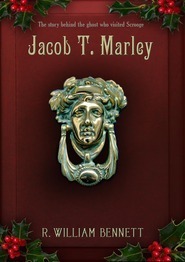More on this book
Community
Kindle Notes & Highlights
It took many years for pride to manifest its impact.
“Once a thing is created, Mr. Marley, I believe it has purpose to it. If I could improve upon these, I would readily remove them. But I cannot. The hand that made these had talents I do not even understand. For me, the loss would be a tragedy, and I fear I would frustrate the intent of their creator.”
None of them achieved any kind of wealth or significance in the worldly sense, but all were happy. This fact annoyed Marley. It was not his own lack of joy in comparison to his siblings that bothered him. It
Yet, while Marley possessed an uncanny ability to reconcile numbers, he had long ago suppressed the greater gift of listening to his conscience.
Marley was entering a cipher upon some ledger that no doubt was the accounting of someone’s life as expressed through the sole lens of the person’s debits, credits, and timeliness of each.
Each man kept hidden from the other, and as much as possible from his own conscience, the one true testament to his life that refused to be released.
There was a monotony of greed that laced every
Scrooge was his only true acquaintance, and as their bond was built not on mutual care but on mutual gain, it never rooted itself in the parts of the soul that, when touched, awaken men’s senses to the truly beautiful and valuable in life.
Yet there was coldness to the visits, as though Marley were approaching the end of his bodily lease and Scrooge were concerned he would not move out by the deadline.
For he was so competent, so driven, so independent that, in a temporal sense, he had never really needed anyone.
He yearned for someone to tell him his life had been successful, to affirm that the single turn he had gotten upon earth had been well spent.
And though in life he had possessed little memory and no care for those he had hurt, somehow, in this spiritual interlude between life and death, he knew them all.
saw parade in front of me the faces of those I had ignored or hurt. I don’t know why I could look upon them in life and yet be blind to them at the same time, but I was just so blind.”
Jacob, you had many opportunities to serve man, you know that. But you did not turn those opportunities into any act of kindness.
“Spirit,” he uttered softly, “why did someone not tell me? Did not anyone care enough to warn me what I was becoming?” “Jacob,” he said imploringly, “every day of your life we called to you.” “I never heard you!” “We reached out to you in every way possible. In thoughts and feelings, by the interactions of others in your way. Why, even your name—that was a sign for you to remember your heritage, to feel the possibility of greatness that was in you. But you discarded it.”
I took not one opportunity, not one, to try to offer a bit of advice that might have lifted his or another’s heart. He yet lives, and my legacy of greed lives with him and, I fear, will condemn him in the end.”
In life, his greatest pleasure had been to feel the heft of the metal box filled with rewards of his work. That heft now burdened him. Each ounce of gain that had at one time brought him pleasure was now a pound of pain.
during the season known for softening men’s hearts, to spend that season with the hardest heart of all. He saw Scrooge growing older, and, in that aging, watched the crust continue to form on him, insulating Ebenezer from any possible love in the world that might have resuscitated his ailing conscience.


